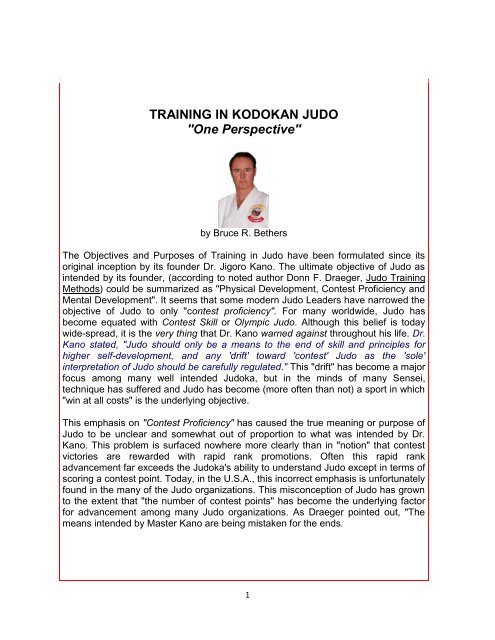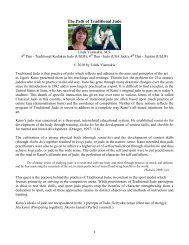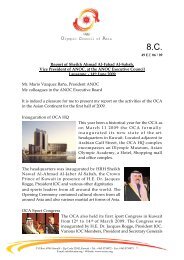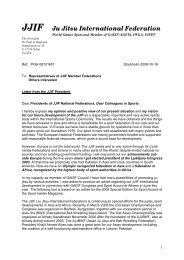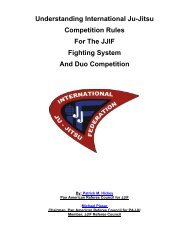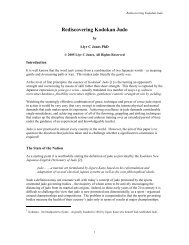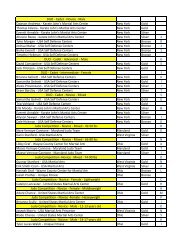TRAINING IN KODOKAN JUDO "One Perspective"
TRAINING IN KODOKAN JUDO "One Perspective"
TRAINING IN KODOKAN JUDO "One Perspective"
You also want an ePaper? Increase the reach of your titles
YUMPU automatically turns print PDFs into web optimized ePapers that Google loves.
<strong>TRA<strong>IN</strong><strong>IN</strong>G</strong> <strong>IN</strong> <strong>KODOKAN</strong> <strong>JUDO</strong><br />
"<strong>One</strong> Perspective"<br />
by Bruce R. Bethers<br />
The Objectives and Purposes of Training in Judo have been formulated since its<br />
original inception by its founder Dr. Jigoro Kano. The ultimate objective of Judo as<br />
intended by its founder, (according to noted author Donn F. Draeger, Judo Training<br />
Methods) could be summarized as "Physical Development, Contest Proficiency and<br />
Mental Development". It seems that some modern Judo Leaders have narrowed the<br />
objective of Judo to only "contest proficiency". For many worldwide, Judo has<br />
become equated with Contest Skill or Olympic Judo. Although this belief is today<br />
wide-spread, it is the very thing that Dr. Kano warned against throughout his life. Dr.<br />
Kano stated, "Judo should only be a means to the end of skill and principles for<br />
higher self-development, and any 'drift' toward 'contest' Judo as the 'sole'<br />
interpretation of Judo should be carefully regulated." This "drift" has become a major<br />
focus among many well intended Judoka, but in the minds of many Sensei,<br />
technique has suffered and Judo has become (more often than not) a sport in which<br />
"win at all costs" is the underlying objective.<br />
This emphasis on "Contest Proficiency" has caused the true meaning or purpose of<br />
Judo to be unclear and somewhat out of proportion to what was intended by Dr.<br />
Kano. This problem is surfaced nowhere more clearly than in "notion" that contest<br />
victories are rewarded with rapid rank promotions. Often this rapid rank<br />
advancement far exceeds the Judoka's ability to understand Judo except in terms of<br />
scoring a contest point. Today, in the U.S.A., this incorrect emphasis is unfortunately<br />
found in the many of the Judo organizations. This misconception of Judo has grown<br />
to the extent that "the number of contest points" has become the underlying factor<br />
for advancement among many Judo organizations. As Draeger pointed out, "The<br />
means intended by Master Kano are being mistaken for the ends.<br />
1
Contest Judo is vital to the health of Judo as an entity, but the objectives of Judo as<br />
originally defined are mutually supplementary and will best be continued by proper<br />
training methods which are suited for physical development and the regard for the<br />
growth of technique on a balanced foundation which regards each individual Judo<br />
exponent".<br />
According to Dr. Kano, "Judo is a way of applying most effectively one's energy,<br />
physical and mental. The secret of the art is to be mastered by training and<br />
cultivating both body and mind through exercises in the prescribed methods of<br />
offense and defense. And, thereby, we may perfect ourselves and contribute to the<br />
welfare of mankind, which is the ultimate aim of Judo".<br />
With the above purposes and objectives in mind it would appear unless an individual<br />
is only in Judo for the "short-term" to win Olympic Medals and other related<br />
competition awards, he or she should focus on proper life-time Judo Training.<br />
Learning the skillful execution of Judo's Technical Theory and striving to perfect<br />
ones Personal Character are much greater & more important goals, than collecting<br />
medals (which only get "dusty" with time). Since the competition side of Judo is an<br />
activity limited by age, time & personal interest, Judoka should consider the<br />
important life-long benefits of Judo Training which go far beyond mere competition<br />
awards. Through Judo Training, the individual will gain physical development and<br />
improved physical & mental fitness for a life-time. Mental Development will be<br />
displayed through increased self-confidence, self-discipline, increased decision<br />
making skills, enhanced sportsmanship, improved mental retention (both "on & off<br />
the mat") and improved reflex-action.<br />
When considering Judo as a method of physical training, the specific exercises of<br />
traditional Judo training should develop, improve and maintain the following:<br />
1. Strength: muscle development and increased endurance.<br />
2. Coordination: Improved efficiency in body movement.<br />
3. Speed & Agility: Improved ability in changing body direction & position with speed<br />
and efficient manner.<br />
4. Balance: Improved stability & control in all positions.<br />
5. Endurance: Improved efficiency of cardiovascular system.<br />
To understand proper training methods of Kodokan Judo, one should focus<br />
on four divisions of training: building technique, building strength, building<br />
endurance and building speed as follows:<br />
2
Building Skillful in Technique is the correct and efficient performance of Judo<br />
movement in accordance with the principles of Judo. It is not just a mechanical<br />
procedure, but instead a reflex action developed by focused & intelligent practice.<br />
Skillful movement wastes little muscular exertion. Building technique is designed<br />
after the basic principle of Kodokan "Maximum Efficiency" or Best Use of Energy.<br />
Skillful Technique is graceful and void of wasteful motion. There are three essential<br />
points to skillful technique-<br />
A. Correct Use of Muscles - Using the correct muscles in the execution of an<br />
action which will accomplish the desired result most effectively and efficiently. Judo<br />
skillful technique can be developed only by continuous practice.<br />
B. Proper Level of Force - Effectively using our muscle power is essential in<br />
producing skillful technique in Judo. It can be expressed as the difference between a<br />
"blow of a sledge hammer" or the "blow of a keen-edged sword" when executing a<br />
Waza in Judo.<br />
C. Timing - Without proper timing, correct use of muscles and proper level of force<br />
will not produce a skillful Judo technique. This point is essential to an economical<br />
use of power. If timing is neglected, results will be, at best, awkward and have the<br />
potential to cause injury. In conclusion, Skillful Technique requires the use of<br />
muscle and strength with proper focus, application and timing. Speed is also<br />
essential to proper Judo performance; however it depends upon the muscle's<br />
reaction to stimuli and the ability for that muscle to contract forcibly. Skill in the final<br />
analysis depends entirely on muscular control. Skill connotes precision and<br />
accuracy of movement, choosing the proper movement in response to an intended<br />
purpose, as well as economy in the force applied, which requires the utilization of<br />
the right muscles at the right time with the right amount of force. In order to<br />
accomplish this performance in totality, strength is necessary.<br />
Building Strength is the necessary and natural result of Judo Training. Draeger<br />
tells us, "Strength is the ability to overcome resistance and the capacity for<br />
endurance. It is affected through the muscles of the body. Muscles have but one<br />
primary function to work". As we train in Judo, the muscles are made to work and<br />
grow to meet the demands of this rigorous activity. Weaker muscles which are<br />
systematically used in Judo Training grow in size, weight and strength. As the<br />
muscles are exercised, within limits, they are more enabled to function with greater<br />
strength and flexibility.<br />
Building Endurance is a direct result or product of progressive Judo Training.<br />
Endurance is the ability to resist and to some degree overcome fatigue. The<br />
common experience of muscle fatigue is due to the creation of waste products of<br />
muscle contraction. Muscle fatigue limits our performance in all activity.<br />
3
According to Draeger, "Endurance must be built by developing the circulatory and<br />
respiratory systems as well as muscles, so that waste products can be more<br />
efficiently carried away and thus reduce the onset of fatigue". A systematic proper<br />
Judo Training program is an excellent method for building endurance. For best<br />
results, daily Judo Training is recommended for aspiring competitors and at least<br />
three times per week is a must for the committed Judoka.<br />
Building Speed is where the "rubber meets the road" so to speak in Judo Training.<br />
Used with correct technique, speed maximizes the element of surprise is both<br />
competition and self-defense. It also minimizes strength and muscle fatigue because<br />
that muscles contract with minimal time and prolonged effort. Draeger states,<br />
"Greater strength in contraction will bring about greater speed. When all obstacles to<br />
muscle contraction have been reduced or removed, speed is a natural development.<br />
Obstacles such as antagonistic muscle action, selection of right muscles in a<br />
particular movement, and the right use of force all bear directly on speed".<br />
Incorporating the above four divisions of training will help ensure that you have<br />
designed an effective Judo Training Program, regardless if your aim is for the "shortterm"<br />
goal of competition awards or the life-long goals of physical/mental fitness,<br />
and the Ultimate Aim of Kodokan Judo - Perfecting Human Character.<br />
4


